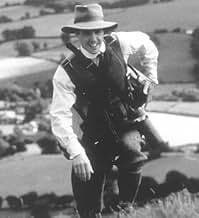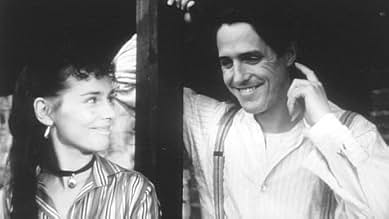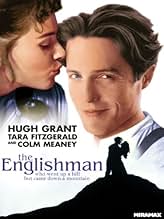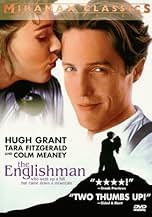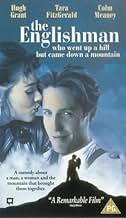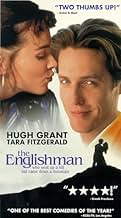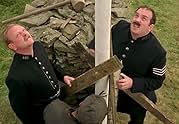IMDb RATING
6.6/10
19K
YOUR RATING
When an English cartographer must tell a Welsh village that their mountain is only a hill, the offended community sets out to change that.When an English cartographer must tell a Welsh village that their mountain is only a hill, the offended community sets out to change that.When an English cartographer must tell a Welsh village that their mountain is only a hill, the offended community sets out to change that.
- Awards
- 1 win & 1 nomination
- Director
- Writers
- All cast & crew
- Production, box office & more at IMDbPro
Storyline
Did you know
- TriviaWhen Williams the Petroleum breaks a piece of the Englishmen's car and pretends to discover it, he says he doesn't know the English name for it, but in Welsh it's called a "beth-yn-galw." "Beth-yn-galw" translates more or less to "whatchamacallit".
- GoofsBetty asks Reginald why he isn't at the front and he replies that he was, at Verdun. The Battle of Verdun involved the German and French armies, so it is most unlikely that he was there. It is more reasonable to suppose that he was involved in the Battle of the Somme, both of which were fought during 1916.
- Quotes
Rev. Robert Jones: Have you no shame?
Morgan the Goat: No... I can't think where I've left it!
- Crazy credits
- Thomas Twp ........ Tudor Vaughan
- Thomas Twp Too (or the other way round) ........ Hugh Vaughan
- Alternate versionsThe US Home video version runs 96 minutes and has the notice "edited for content" at the beginning. It is rated PG.
- SoundtracksMen of Harlech
The Gwalia Male Voice Choir, London
(sung in Welsh)
Featured review
The Englishman Who Went Up a Hill But Came Down a Mountain is directed by Christopher Monger and written by Ivor Monger. It stars Hugh Grant, Ian McNeice, Tara Fitzgerald, Colm Meaney and Kenneth Griffith. Music is by Stephen Endelman and cinematography by Vernon Layton.
Set in 1917, plot finds Grant and McNeice as two English cartographers who arrive in the Welsh village of Ffynnon Garw to measure what the locals proudly proclaim to be Wales' first mountain. However, it turns out that the "mountain" is 16 feet below the required 1000 feet requisite so therefore can only be classed as a hill. This news causes disgust amongst the locals, who then set about stopping the cartographers going home whilst they attempt to build atop of the hill to make it over 1000 feet.
A film with a big title that is matched by the size of its heart, Monger's film owes much to those fun community based pictures that filed out of Ealing Studios back in the 40s and 50s, Re: Whisky Galore! and The Titfield Thunderbolt. We can also safely place it the whimsy category where something as wonderful as Local Hero sits, while the old British comedy staple that encompasses an obsession with size (The Mouse That Roared) watches over the film like an approving British cinematic angel.
Homespun humour marries up with the utterly engaging view of quirky village life to provide us with just under 100 minutes of entertainment. Although clearly simple in plot and structure, to simply dismiss it as such does not do justice to the fine work of the ensemble cast and the writing of Ivor and Chris Monger. With Grant doing what he does best, the amiable nervous fop, picture has a lead actor fully comfortable with the tone and texture of the production, while around him there are a number of fine character actors putting delightful meat on the comedy bones of oddball characters with names such as Morgan the Goat, Johny Shellshock, William the Petroleum and Betty from Cardiff! Best of the bunch is Griffith as Reverend Jones, a grumpy, stubborn eccentric who underpins everything so wonderfully skew-whiff about life in Ffynnon Garw.
As for the writing? The screenplay has a wonderful ear for small village dialogue, while in amongst the value of community spirit theme, sits a near sombre observation of the effects of war on such a community. The production design is appealing, with Layton's photography around the Powys locations a visual treat, and Endelman's music has a suitably warming and jaunty feel; even if it starts to get a touch repetitive later in the piece. It doesn't have widespread appeal, it's clearly a film aimed at a small portion of film fans that love those films mentioned earlier. But in an era when film is being smothered by CGI and visual gimmickry, revisiting something like The Englishman Who Went Up a Hill But Came Down a Mountain offers up a most refreshing and diverting experience. 8/10
Set in 1917, plot finds Grant and McNeice as two English cartographers who arrive in the Welsh village of Ffynnon Garw to measure what the locals proudly proclaim to be Wales' first mountain. However, it turns out that the "mountain" is 16 feet below the required 1000 feet requisite so therefore can only be classed as a hill. This news causes disgust amongst the locals, who then set about stopping the cartographers going home whilst they attempt to build atop of the hill to make it over 1000 feet.
A film with a big title that is matched by the size of its heart, Monger's film owes much to those fun community based pictures that filed out of Ealing Studios back in the 40s and 50s, Re: Whisky Galore! and The Titfield Thunderbolt. We can also safely place it the whimsy category where something as wonderful as Local Hero sits, while the old British comedy staple that encompasses an obsession with size (The Mouse That Roared) watches over the film like an approving British cinematic angel.
Homespun humour marries up with the utterly engaging view of quirky village life to provide us with just under 100 minutes of entertainment. Although clearly simple in plot and structure, to simply dismiss it as such does not do justice to the fine work of the ensemble cast and the writing of Ivor and Chris Monger. With Grant doing what he does best, the amiable nervous fop, picture has a lead actor fully comfortable with the tone and texture of the production, while around him there are a number of fine character actors putting delightful meat on the comedy bones of oddball characters with names such as Morgan the Goat, Johny Shellshock, William the Petroleum and Betty from Cardiff! Best of the bunch is Griffith as Reverend Jones, a grumpy, stubborn eccentric who underpins everything so wonderfully skew-whiff about life in Ffynnon Garw.
As for the writing? The screenplay has a wonderful ear for small village dialogue, while in amongst the value of community spirit theme, sits a near sombre observation of the effects of war on such a community. The production design is appealing, with Layton's photography around the Powys locations a visual treat, and Endelman's music has a suitably warming and jaunty feel; even if it starts to get a touch repetitive later in the piece. It doesn't have widespread appeal, it's clearly a film aimed at a small portion of film fans that love those films mentioned earlier. But in an era when film is being smothered by CGI and visual gimmickry, revisiting something like The Englishman Who Went Up a Hill But Came Down a Mountain offers up a most refreshing and diverting experience. 8/10
- hitchcockthelegend
- Sep 25, 2011
- Permalink
Details
- Release date
- Country of origin
- Official site
- Languages
- Also known as
- The Englishman who went up a hill but came down a mountain
- Filming locations
- Gyrn Moelfre, Powys, Wales, UK(Ffynnon Garw hill/mountain)
- Production companies
- See more company credits at IMDbPro
Box office
- Budget
- $40,997,769 (estimated)
- Gross US & Canada
- $10,904,930
- Opening weekend US & Canada
- $2,811,355
- May 14, 1995
- Gross worldwide
- $10,904,930
Contribute to this page
Suggest an edit or add missing content

Top Gap
By what name was The Englishman Who Went Up a Hill But Came Down a Mountain (1995) officially released in India in English?
Answer


